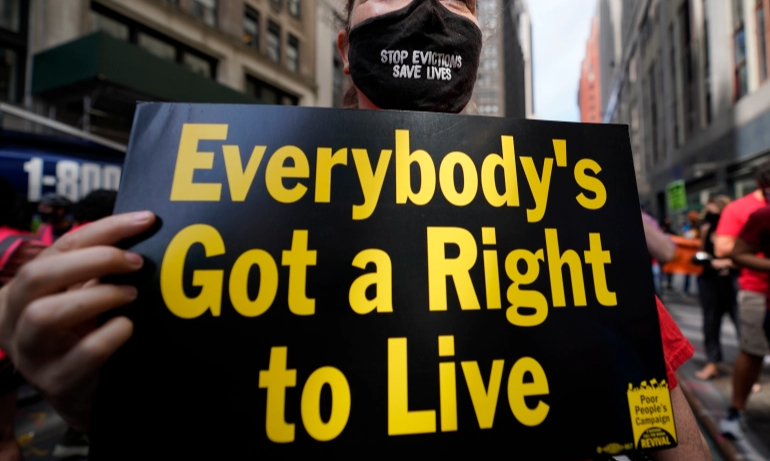
Some 750,000 U.S. households could be evicted across the United States before the end of the year, global investment firm Goldman Sachs estimates.
New York, September 18 (RHC)-- As Hurricane Ida barrelled towards the southeast coast of the United States in late August, 23-year-old Vashante Gray, her two children aged two and six, and her mother, Kristi Brown, 45, found themselves with no place to live.
After their building was sold to a new landlord who wanted everyone out to renovate, Gray and dozens of other renters were told they had to get out of their Starkville, Mississippi apartment complex. Some were given just days to do so.
Thanks to funding from a local community group, Gray and her two children have been in a hotel since. Her mother is being housed in a hotel as well, but in a different one across town, leaving Gray without childcare and struggling to get herself to work and her children to school as a result.
“They’re putting multiple families on the street,” Gray told Al Jazeera. “A lot of them have disabled babies and don’t have the funds to move and they’re not getting money back from rent that was paid.”
With the U.S. Supreme Court ending the country’s national moratorium on evictions on August 26, hundreds of thousands of renters could soon find themselves in the same position as Gray and her family – with nowhere to live.
While Congress could still revive the national eviction ban legislatively and a handful of states still have individual eviction moratoria in place, the global investment firm Goldman Sachs estimates that roughly 750,000 households could be evicted across the country before the end of the year.
According to Jasmine Rangel, a research specialist at Princeton University’s Eviction Lab that studies the affordable housing crisis, the ban has been an effective means of keeping people housed during the COVID-19 public health crisis.
“Throughout the pandemic, states that have been abiding by the law and following the guidelines saw a significant drop in evictions, or at least a smaller proportion of eviction filings compared to any other normal year in that state,” she told Al Jazeera.
Now that the nationwide eviction moratorium is over, she expects that the forthcoming evictions will not be spread evenly across the states. “Certain states make it easier, cheaper and faster to evict, especially if [landlords] can quickly file in bulk,” she said.
The number and speed of evictions are also often related to the size of a landlord’s holdings as well. “We know that a particular set of landlords in large cities are responsible for a larger share of evictions,” Rangel said. “It’s not unlikely that a landlord that owns a lot of units can be a single person, but very often they’re large corporations.”
Conversely, she noted that smaller “mom-and-pop landlords” are typically more inclined to find ways to help by setting up payment plans and the like. Beyond potentially putting people on the streets during a global pandemic, Rangel sees the end of the federal ban as antithetical to the country’s efforts to bounce back economically from the pandemic.
Just like Gray, who is struggling to get to work from a new location without a car or childcare, “those who face eviction are more often than not likely going to lose their jobs, too,” Rangel explained, pointing to Eviction Lab research (PDF) that links evictions to declines in economic opportunities for certain families.
In light of such declining economic opportunities, many people rely on affordable housing to have a place to live. But there are just 37 affordable and available units in existence for every 100 extremely low-income households (those making less than 30 percent of their area’s median income), research by the nonprofit National Low Income Housing Coalition shows.

